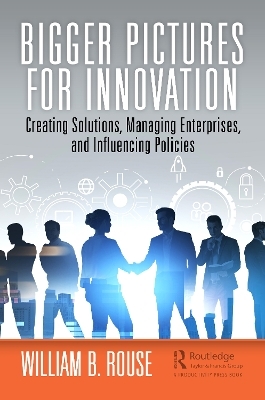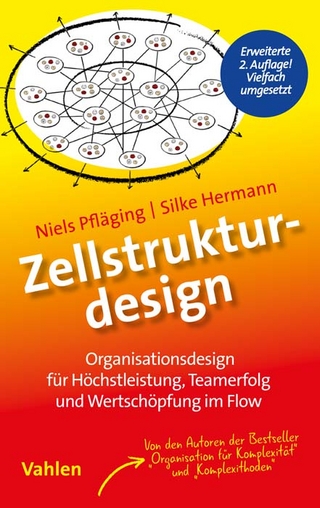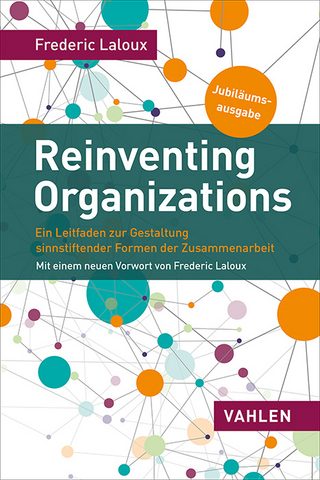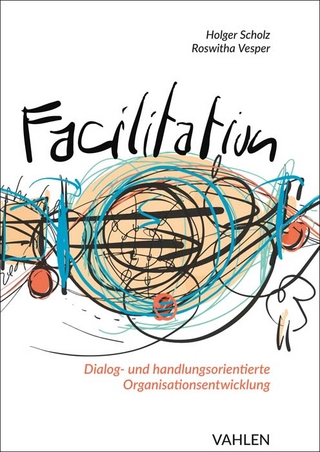
Bigger Pictures for Innovation
Productivity Press (Verlag)
978-1-032-43056-0 (ISBN)
The author’s work in these domains has often led to the question: "Well, why does it work like that?" He invariably sought to understand the bigger picture to find the sources of requirements, constraints, norms, and values. He wanted to understand what could be changed, albeit often with much effort to overcome resistance.
He found that higher levels of an ecosystem often provide the resources and dictate the constraints imposed on lower levels. These prescriptions are not just commands. They also reflect values and cultural norms. Thus, the answers to the question were not just technical and economic. Often, the answers reflected eons of social and political priorities. The endeavors related in the book frequently involved addressing emerging realities rather than just the status quo. This book is an ongoing discovery of these bigger pictures.
The stories and the lessons related in this book provide useful perspectives on change. The understanding of people and organizations that emerges from these lessons can help to enable transformative change. Fundamental change is an intensely human-centric endeavor, not just for the people and organizations aspiring to change, but also for the people helping them. You will meet many of these people in this book as the stories unfold.
The genesis of this book originated in a decision made early in the author’s career. He had developed a habit of asking at the end of each day, "What did I really accomplish today?" This was sometimes frustrating as he was not sure the day had yielded any significant accomplishments. One day it dawned on him that this was the wrong question – He needed to ask, "What did I learn today?" It is always possible to learn, most recently about public health and climate change.
In planning this book, the author first thought in terms of accomplishments such as projects conducted, systems built, and articles and books published. He could not imagine this being interesting to readers. Then, it struck him – It is much more interesting to report on what he learned about people and organizations, including how he helped them accomplish their goals. This is a book of stories about how these lessons emerged.
In planning this book, the author first thought in terms of accomplishments such as projects conducted, systems built, and articles and books published. He could not imagine this being interesting to readers. Then, it struck him – It is much more interesting to report on what he learned about people and organizations, including how he helped them accomplish their goals. This is a book of stories about how these lessons emerged.
William B. Rouse is Research Professor in the McCourt School of Public Policy at Georgetown University, as well as Senior Fellow in the office of the Senior Vice President for Research, Professor Emeritus and former Chair of the School of Industrial and Systems Engineering at the Georgia Institute of Technology, and Principal at Curis Meditor, a firm focused on the health of people, processes, organizations, and society. His research focuses on understanding and managing complex public-private systems such as healthcare delivery, higher education, transportation, and national security, with emphasis on mathematical and computational modeling of these systems for the purpose of policy design and analysis. Rouse has written hundreds of articles and book chapters, and has authored many books, including most recently Transforming Public-Private Ecosystems (Oxford, 2022), Failure Management (Oxford, 2021), Computing Possible Futures (Oxford, 2019), Universities as Complex Enterprises (Wiley, 2016), Modeling and Visualization of Complex Systems and Enterprises (Wiley, 2015), Understanding and Managing the Complexity of Healthcare (MIT Press, 2014), Economic Systems Analysis and Assessment (Wiley, 2011), People and Organizations: Explorations of Human-Centered Design (Wiley, 2007), Essential Challenges of Strategic Management (Wiley, 2001) and the award-winning Don’t Jump to Solutions (Jossey-Bass, 1998). He has edited or co-edited numerous books including Perspectives on Complex Global Challenges (Wiley, 2016), Engineering the System of Healthcare Delivery (IOS Press, 2010), The Economics of Human Systems Integration (Wiley, 2010), Enterprise Transformation: Understanding and Enabling Fundamental Change (Wiley, 2006), Organizational Simulation: From Modeling & Simulation to Games & Entertainment (Wiley, 2005), the best-selling Handbook of Systems Engineering and Management (Wiley, 1999, 2009), and the eight-volume series Human/Technology Interaction in Complex Systems (Elsevier). Among many advisory roles, he has served as Chair of the Committee on Human Factors (now Board on Human Systems Integration) of the National Academies, a member of the advisory committee for the Division of Behavioral and Social Sciences and Education of the National Academies, a member of the U.S. Air Force Scientific Advisory Board, and a member of the DoD Senior Advisory Group on Modeling and Simulation. He has been designated a lifetime National Associate of the National Research Council and National Academies. Rouse is a member of the National Academy of Engineering and has been elected a fellow of four professional societies -- Institute of Electrical and Electronics Engineers (IEEE), the International Council on Systems Engineering (INCOSE), the Institute for Operations Research and Management Science (INFORMS), and the Human Factors and Ergonomics Society (HFES). Rouse received his B.S. from the University of Rhode Island, and his S.M. and Ph.D. from the Massachusetts Institute of Technology.
Chapter 1: Introduction & Overview Chapter 2: Human Behavior & Performance Chapter 3: Organizational & Economic Performance Chapter 4: Design of Training & Aiding Chapter 5: Human-Centered Design Chapter 6: Advisor Series of Software Tools Chapter 7: Enterprise Transformation Chapter 8: Healthcare & Education Chapter 9: Modeling & Visualization Chapter 10: Complex Societal Systems Chapter 11: Looking Back
| Erscheinungsdatum | 24.08.2022 |
|---|---|
| Zusatzinfo | 11 Line drawings, black and white; 11 Illustrations, black and white |
| Verlagsort | London |
| Sprache | englisch |
| Maße | 152 x 229 mm |
| Gewicht | 570 g |
| Themenwelt | Wirtschaft ► Betriebswirtschaft / Management ► Planung / Organisation |
| Wirtschaft ► Betriebswirtschaft / Management ► Unternehmensführung / Management | |
| Wirtschaft ► Volkswirtschaftslehre | |
| ISBN-10 | 1-032-43056-7 / 1032430567 |
| ISBN-13 | 978-1-032-43056-0 / 9781032430560 |
| Zustand | Neuware |
| Informationen gemäß Produktsicherheitsverordnung (GPSR) | |
| Haben Sie eine Frage zum Produkt? |
aus dem Bereich


